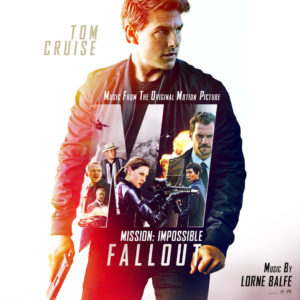 After exploring the soundtrack of Mission: Impossible – Fallout composed by Lorne Balfe, I really had my doubts if I wanted to review it: I have already reviewed his score for Pacific Rim: Uprising, which was not really positive, and my initial thoughts about his score for the latest addition to the Mission: Impossible franchise were not very positive either. I was planning to pass this score and focus on others. In the meantime, this score was a subject in many discussions between film music critics on the internet where there was a lot of negativity, but there were also quite some people who liked the score. After seeing the movie, I came to the conclusion that I would really like to write down my thoughts about the music of this score.
After exploring the soundtrack of Mission: Impossible – Fallout composed by Lorne Balfe, I really had my doubts if I wanted to review it: I have already reviewed his score for Pacific Rim: Uprising, which was not really positive, and my initial thoughts about his score for the latest addition to the Mission: Impossible franchise were not very positive either. I was planning to pass this score and focus on others. In the meantime, this score was a subject in many discussions between film music critics on the internet where there was a lot of negativity, but there were also quite some people who liked the score. After seeing the movie, I came to the conclusion that I would really like to write down my thoughts about the music of this score.
Most of the time when you hear people talk about a Mission: Impossible movie nowadays, two things will probably come to your mind. The first thing is Tom Cruise, since he has been part of this franchise for more than 20 years, and the second will be its iconic theme composed by Lalo Schifrin. Almost every Mission: Impossible movie had music by a different composer, with big names such as Danny Elfman, Hans Zimmer, Michael Giacchino (for two movies) and Joe Kraemer. Each composer wrote a score in his own style. Lorne Balfe’s own flavor added to the theme can be heard in “Fallout,” using massive chords from the brass players and bongos, and in “Mission: Accomplished” where he include a choir. As to the rest of the score, the first track “A Storm Is Coming” sums up his vision perfectly: more massive brass playing chords and bongos – a lot of bongos. For the music, he used 12 percussionists to play the bongos and many other melodic lines and rhythms were done with a large number of musicians as well. The album is more than 90 minutes long and most of it consists of filler music for the action sequences with long percussion parts – with bongos most of the time – as well as simple melody lines and simple musical patterns laid on top. Many tracks could be used as an example here. The ones that stood out for me were “A Terrible Choice,” “And The Warrior Whispers Back” and “Escape Through Paris.” This last track ends with a short version of the famous Mission: Impossible theme, but also Balfe’s main theme for this movie can be found in this track, which is a pattern of three long notes which sound like the first three notes in the old Mission: Impossible theme. As with the bongos, it can be heard throughout the whole score, with “Kashmir” as the best example. The bad guys do not really get a theme. The only thing that comes close to it is a pattern of a couple of notes on the piano that can be heard in certain spots, as for example in “Good Evening, Mr. Hunt,” “No Hard Feelings” and “The White Widow.”
While I was researching what other film music enthusiasts liked or did not like about this score, I found out that most of the positive views about the music focused on the argument that the music fits very well with the movie, which is an argument that I hear a lot about film music in general. While I can agree that most of the time, the music fits in a movie, I am also convinced that good film music can influence the emotions of the audience in a major way without them even knowing it. To explain this principle a bit further, I would like to point out two vehicle chase sequences that this movie has: One was with Ethan Hunt doing all kinds of crazy stunts on a bike, while in the background I could only hear the bongos with hardly any complex melodies at all, making the whole sequence a bit bland to me. The second chase sequence was even worse: it was a car chase and during the whole scene there was no music at all. I think the major problem with this score is that while the movie has a lot of action scenes, the music that plays in the background lacks emotion. If you are wondering how an action scene would have sounded where themes, bongos, emotion and the inclusion of a choir would have been used, you are in luck, because “Stairs and Rooftops” is exactly that. This track stands out above everything else on this album, and if Balfe would have used the musical approach of this track in all the action sequences, this score would have been a much more enjoyable listening experience for me. This track is exactly what I want to hear musically when I am watching action scenes of a movie.
To conclude my thoughts on the music, I do not think it is a good score for the Mission: Impossible franchise. First of all, I think that the music has gone into a direction where it does not fit with the iconic theme by Schifrin. Secondly, as I mentioned before, the major problem this soundtrack has is the absence of any emotion in the majority of the tracks. Maybe it would have been better to make some cuts to reduce the size of this album. It would make the highlights “Fallout,” “Mission: Accomplished” and “Stairs and Rooftops” stand out more. To me, this album sounds like quantity over quality. Some people prefer all the music that was played during the movie to be put on the album – including all the brainless bongos and chords. However, I prefer less music that has more thought and emotion.
Listen or buy
- Buy this soundtrack from Amazon.com or iTunes
- Listen to this soundtrack on Spotify
Tracklist
The highlights are in bold.
- A Storm Is Coming (1:12)
- Your Mission (2:14)
- Should You Choose To Accept… (2:34)
- The Manifesto (1:44)
- Good Evening, Mr. Hunt (4:19)
- Change Of Plan (5:47)
- A Terrible Choice (2:54)
- Fallout (1:30)
- Stairs And Rooftops (6:00)
- No Hard Feelings (4:20)
- Free Fall (4:14)
- The White Window (4:42)
- I Am The Storm (2:07)
- The Exchange (5:54)
- Steps Ahead (1:02)
- Escape Through Paris (5:05)
- We Are Never Free (6:57)
- Kashmir (4:29)
- Fate Whispers To The Warrior (3:54)
- And The Warrior Whispers Back (3:56)
- Unfinished Business (1:49)
- Scalpel And Hammer (5:10)
- The Syndicate (6:00)
- Cutting On One (3:42)
- The Last Resort (2:55)
- Mission: Accomplished (1:15)
Total length: 1 hour and 35 minutes
Paramount Music (2018)




